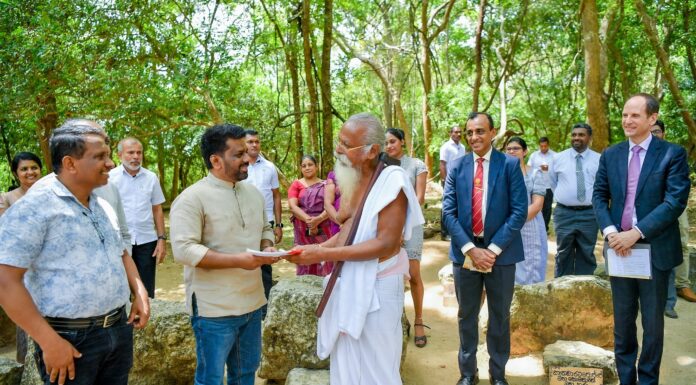August 10, Colombo (LNW): Sri Lanka today marked the International Day of the World’s Indigenous Peoples with a national ceremony held at the Indigenous Museum in Dambana, under the leadership of President Anura Kumara Dissanayake.
The occasion served not only as a formal tribute to the island’s indigenous heritage but also as a vibrant celebration of the traditions and wisdom preserved by the Vedda community.
The day’s proceedings unfolded with reverence and symbolism. President Dissanayake began the morning by offering floral tributes to the memorial of the late indigenous elder Uruwarige Tisahami Aththo, a respected figure within the community.
A white sandalwood sapling was also ceremonially planted in the museum’s courtyard—a gesture intended to symbolise continuity, renewal, and respect for ancestral land.
This year’s commemoration, organised through the collaborative efforts of government departments and private entities, highlighted the cultural richness of Sri Lanka’s indigenous population. Among the featured traditions was the sacred kiri koraha ritual, performed to invoke blessings of peace, harmony, and prosperity for all people and the natural world.
Central to the event was the participation of Vishwa Keerthi Sri Vanaspathi Uruwarige Vannila Aththo, the current leader of the Vedda people. He presented President Dissanayake with a commemorative plaque along with a message detailing the community’s ongoing concerns and aspirations—ranging from environmental protection and cultural preservation to access to education and healthcare.
In a gesture of mutual respect, the President offered a symbolic gift to the indigenous leader, acknowledging the enduring contributions of the community to the nation’s cultural identity and environmental stewardship.
A key highlight of this year’s observance was the introduction of Sri Lanka’s first indigenous herbal soap, Kairie, developed using traditional botanical knowledge and native ingredients. The initiative aims to blend ancestral wisdom with modern economic opportunity, providing sustainable income sources for indigenous women.
Certificates were also awarded to the inaugural group of female participants who completed a training programme in Ayurvedic soap production, marking a step forward in community-led enterprise.
The event additionally saw the commencement of construction on market stalls intended to showcase and sell indigenous crafts and products—a move designed to further integrate the community into the local economy while safeguarding their traditions.
Among those in attendance were Minister of Buddhasasana, Religious and Cultural Affairs Dr Hiniduma Sunil Senevi, several government ministers and officials, as well as the Canadian High Commissioner to Sri Lanka and the Maldives, Eric Walsh, accompanied by representatives from the Canadian High Commission and other distinguished guests.

